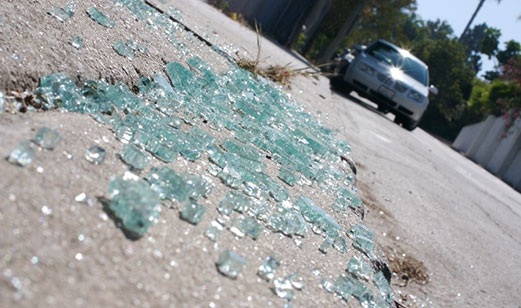It's a scary feeling: You come outside, keys in hand, ready to jump in your car—and it's not there. It's nowhere to be seen, and you're certain it was parked right there. What do you do now?

Once every 44 seconds, a car is stolen in the U.S., according to the National Highway Traffic Safety Administration.
Becoming the victim of vehicle theft can be a frustrating experience,
but we've got some tips to help you deal with the crisis.
Think It Through
It may seem like a no-brainer, but it's important to consider
whether your car was actually stolen—not towed, misplaced or possibly
even repossessed. Did you accidentally park under a "No Parking" sign?
Did you park in the east garage at the airport before your two-week
trip, but somehow in the interim convinced yourself your car was in the
west garage? Are you behind on any loan or lease payments? Take a moment
to make sure there's no other explanation for the absence of your car.
If you think your car has been towed, check to see if your vehicle has been impounded or repossessed.
Call the Police
If you're fairly certain that your car hasn't been towed or misplaced, it's time to call the police and file a report.
You'll need to give a detailed description of your vehicle, and if
possible, it is helpful to have your vehicle identification number
(VIN), registration, license plate number and driver's license available
when you file the report. In many cases, the police will add your
vehicle information to nation- and statewide records, which should make it harder for the thief to sell or re-title your car.
Be Tech-Savvy
Not long ago, an aftermarket system known as LoJack
was the only service available to help car owners track and recover
their stolen vehicles. However, many automakers now offer a telematics
system, which can help law enforcement officers find your stolen car.
General Motors' OnStar and Toyota's Safety Connect, for example, can both help the police locate your car by using GPS technology. Some systems have even more capabilities. For example, Hyundai's Blue Link
system can gradually reduce a stolen vehicle's engine power to slow it
down, or immobilize the engine to keep it from starting. If your vehicle
has any type of system that may help to locate it, make sure to notify
the police.
Call Your Auto Insurance Company
After you've filed a police report, call your insurance company to let them know that your car has been stolen. This is a particularly important step, since informing your insurance provider can help protect you
in case your car is used to cause harm or damage after the theft. Try
to provide as much information as possible. It helps if you can give a
good description of your vehicle, the location of all your keys and a
list of any personal property inside the car. If your car is leased or
financed, you should also call the lender that you used to purchase the
vehicle.
Stop Car Theft Before it Happens
The NHTSA says 40 to 50 percent of stolen cars are a result of owner mistakes or oversights. Make sure that you always lock your car,
take your keys with you, and avoid keeping a spare set hidden in your
car. Never leave your car running, and make sure that the doors are
locked and your windows are rolled up. It also helps to park in a
well-lit area and hide any valuables that might attract thieves. A
little common sense can go a long way when it comes to deterring car
thieves.
Another step you can take now, to help protect yourself in the event your car is stolen, is to make sure you have comprehensive coverage, which typically covers losses due to theft, as part of your auto insurance policy. Have questions about protecting your vehicle from theft? Contact an Allstate agent.
Another step you can take now, to help protect yourself in the event your car is stolen, is to make sure you have comprehensive coverage, which typically covers losses due to theft, as part of your auto insurance policy. Have questions about protecting your vehicle from theft? Contact an Allstate agent.
0 评论:
Post a Comment